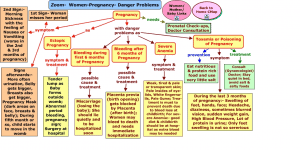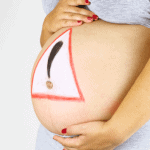Most problem during pregnancy are minor and they can be reported to your doctor on themselves next visit. The development of any of the following symptoms are of serious concern and you should immediately seek consultation to your doctor.
they can be reported to your doctor on themselves next visit. The development of any of the following symptoms are of serious concern and you should immediately seek consultation to your doctor.
Vaginal bleeding (with or without cramping and pain)
Some spotting or light bleeding during pregnancy can be normal and not a sign of a serious problem. However, it is important to make sure and to find out the cause promptly. Heavy vaginal bleeding could be a sign of miscarriage.![]()
What to do:
If you are concerned, seek medical advice from your gyno . You may be referred for an ultrasound scan or other tests.
Excessive nausea and vomiting
Morning sickness, or nausea and vomiting in pregnancy is common and normal in the first trimester. It doesn’t present a risk to the growing baby and usually clears up by the 12th or 14th week of pregnancy. However, if vomiting or sickness becomes excessive, it can have serious implications. Excessive vomiting can lead to weight loss, dizziness, dehydration and an imbalance of electrolytes.
What to do:
Contact your doctor straight away if you:
- Have urine that is very dark or you haven’t passed urine for more than eight hours.
- Experience repeated vomiting. I experience the same situation, my gyno suggest me some medicines after that the problem of repeated vomiting minimize.

- Have blood in vomit
- Cannot keep food or drink down for 24 hours
- Feel very weak, dizzy or faint when you stand up
- Have tummy or abdominal pain. Some lady feels little pain in her tummy all the time during pregnancy, but if pain exceed and become intolerable. Immediate concern to your doctor is always a good choice.
- Have a fever of 38C (100.4F) or higher
- Experience a fast, racing heart rate
Fever or raised temperature
A very high temperature during pregnancy may be a serious sign. Pregnant women are at a higher risk of complications of flu, which is why a flu jab is now advised during pregnancy.
A high body temperature during the first trimester can also be associated with birth defects known as neural tube defects because the neural tube forms during the first trimester.
Raised temperatures during pregnancy that are accompanied with other symptoms such as muscle aches may be a sign of infection such as cytomegalovirus (CMV), toxoplasma and parvovirus.
Pregnant women without cold and flu symptoms but a temperature above 37.5 C seek medical advice as it could indicate an infection. If the temperature is over 39C, call the midwife or doctor immediately as infection is more likely.
| Warning Signs | |
| 1 | Sudden spotting or bleeding from vagina. |
| 2 | Fever of 100 F or more without any symptoms of common cold. |
| 3 | Severe nausea and persistent vomiting |
| 4 | Discomfort or burning sensation while passing urine |
| 5 | Marked swelling of feet or swelling of hands and face. |
| 6 | Severe persistent headache |
| 7 | Blurring of vision or spots before themselves eyes. |
| 8 | Unusual abdominal pain not relieved by a bowel movements. |
| 9 | Sudden gush or trickle of water from vagina. |
| 10 | Sluggish or stoppage of fetal movements. |
| 11 | Skin rash,itching or genital sores |
| 12 | Dizziness and fainting |
| 13 | Accident or fall
ref: http://www.webmd.boots.com/pregnancy/guide/7-first-trimester-warning-signs |
